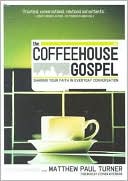
The back cover of Shawn Wood's newest book, "Wasabi Gospel", gives you some warning about what to expect inside the covers:
Have you ever eaten wasabi? That dainty green blob on your sushi plate may look pretty tame, but take a taste - or even a whiff - and you'll find that little dollop packs a powerful punch to your senses!
If you have ever gotten too much wasabi at once, you know that the experience, well, it gets your attention in a hurry! And if you haven't ever gotten ambushed by wasabi, just imagine the sudden discovery of a fire bursting to life somewhere in you sinuses.
This sucker punch quality of wasabi is where the title for the book comes from. Wood pulls seven pieces of Scripture from the Gospels and explains how startling the meaning is within them. (Thus the subtitle "The Startling Message of Jesus"). These seemingly innocent words and lessons from Jesus, when considered seriously, can giev you a good wallop.
Wasabi Gospel can almost be seen as two books in one. There are seven sections/chapters to the book and each one has two distinct pieces: the discussion about the Scripture directly and an ongoing story/journal called Laura's Story. At the beginning of eash section, a day's entry in Laura's journal is given to the reader. I was quickly drawn into her story and, in the end, really enjoyed this approach to the material as much as the chapters themselves.
The seven passages of Scripture from the Gospels that Shawn brings to us to consider deal with mercy and forgiveness of others (Matthew 5:7), personal guilt (Luke 7:36-48), love your enemies (Matthew 5:43-48), the 'rich young ruler' (Mark 10:24-25), children (Mark 9:42), leaving yoru sin behnd you (Luke 9:62), and why we sin (Matthew 5:30). Each chapter digs deep into what it means for us to take the words of Jesus seriously in each one of these passages. What it looks like in our lives both with and without understanding Jesus' message.
Shawn has a very comfortable and informal writing style that I find very likable. He mixes in appropriate personal stories with Biblical analysis. His use of humor and self deprecation work well alongside the subject matter. I'm sure that being about the same age with similar good ole South Carolina small town upbring doesn't hurt!
Here's an example of how Shawn shares his thoughts on the story of the "sinful woman" at the house of Simon the Pharisee -
I know many of you would say "dirty, rotten Pharisees." I am tempted to say the same thing. But then I remember that I would probably be right there with them. I would be a "dirty, rotten Pharisee," scoffing at Jesus' supposed divine power. You might be quick to deny it , but let's think about this: sometimes when you really see the facts in front of you (like calling sushi dead raw fish) they start to look a lot different.
Fact one: A guy shows up on the scene saying he is God.
Fact two: Said guy says that he can heal people.
Fact three: The word on the street from his followers is that he can calm the sea, can walk on water, and has been known to turn water into wine.
Fact four: (Here is the doozie) He says that he is God and can forgive sins.
Now given these facts that we cannot see, are you telling me that you would be a follower? When you look at it on paper, he sounds a little like David Koresh to me.
At the end of most chapters, Wood has a section called 'Take a Bite.' In these sections, the author provides a short and practical set of questions to help you see where the principle from the chapter's Scripture is or can affect your life. Wood even includes a small prayer in each one of these sections that I found to be very helpful.
All in all, "Wasabi Gospel" is a relatively small book that can pack a strong punch (not unlike wasabi itself). I really enjoyed the book and recommend it to everyone. It doesn't matter if you are already acquainted with the Gospels after years of growing up in a church or if you are just starting to wonder what Jesus was really about, the one-two wasabi combination punch will get your attention - in a good way...
You can find out more about "Wasabi Gosepl" over at www.wasabigospel.com. And you can catch up with the author, Shawn Wood, on twitter, facebook, or his blog.
And don't forget the "Book Bomb" going on over at Amazon.com
 I had not read a book by Andy Stanley before. I have been listening to the
I had not read a book by Andy Stanley before. I have been listening to the  Matthew Paul Turner has
Matthew Paul Turner has 





